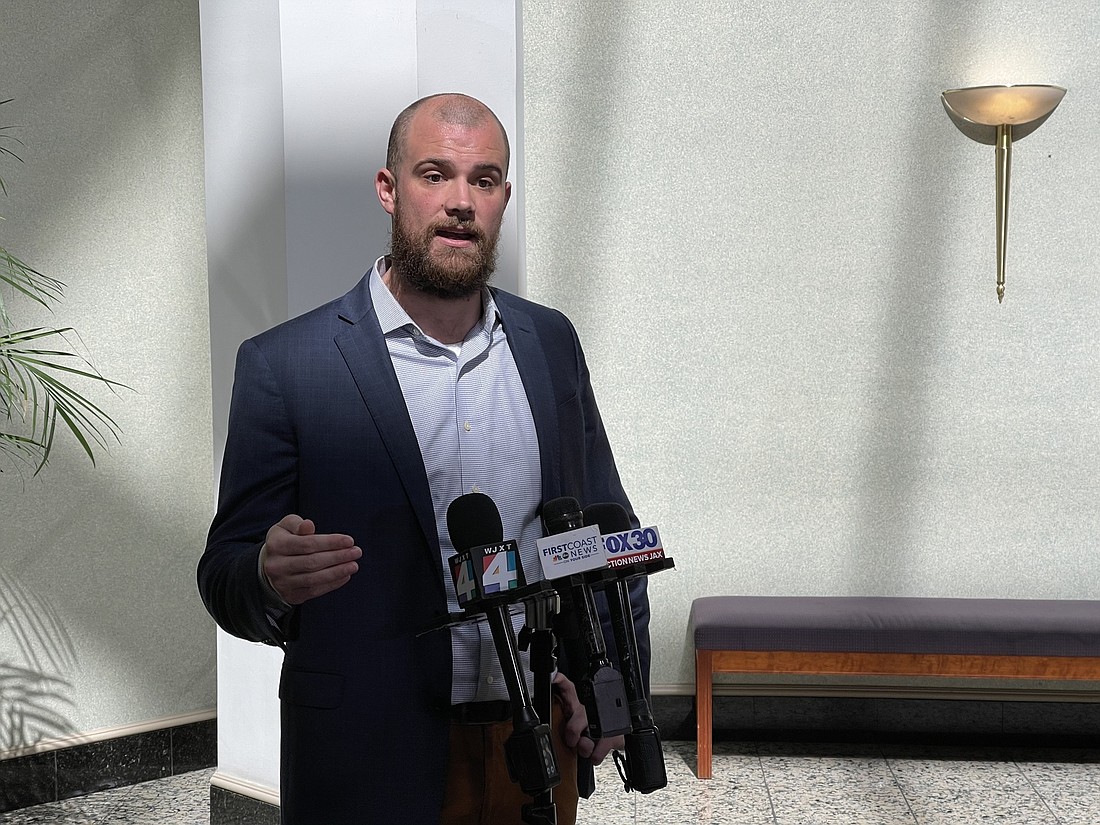
The city would extend and double Duval County’s local option gas tax to pay for transportation infrastructure projects and free money to address Jacksonville’s aging septic tanks under a proposal by Mayor Lenny Curry.
Chief of Staff Jordan Elsbury said in a news conference March 10 the mayor wants a 10-year extension of the current gas tax to 2046 and an additional 6 cents per gallon.
Elsbury said revenue from the gas tax increase would free nearly $300 million to $400 million in general fund revenue, which Curry wants to use to “take a substantial bite” out of Duval County’s estimated $2 billion failing septic tank problem.
“We’ve arrived at a point where, to sustain the budgets that we have, to continue to fund public safety and everything, to really fund infrastructure needs for a county of our size, we need to meet a revenue capacity that other counties of our size and our neighbors have,” Elsbury said.
The administration has reached a revenue-sharing agreement with the Jacksonville Transportation Authority for the tax proceeds.
Under the gas tax extension approved by City Council in 2014, JTA receives 5 cents of the 6-cent tax through 2036.
Elsbury said the independent authority and city would split future revenue equally under the new proposal.
Curry met with City Council members and Duval County civic group during the last several months to gain support for the tax increase, according to Elsbury.
Florida statute allows counties and municipalities to use local option gas tax revenue only for transportation-related infrastructure projects.
Part of Curry’s sales pitch is the targeted nature of gas tax revenue, Elsbury said.
“So an administration cannot come in after Mayor Curry and rededicate that to some other portion of the budget or pet projects,” he said.
“It’s locked into infrastructure, which is why we’re comfortable with it.”
The projects
JTA and the city will propose advancing a combined $930.2 million in roadway, drainage and transportation improvements with the gas tax revenue, according to a chart provided by JTA.
Elsbury said the city will finalize the list of projects this week, but all are approved as part of the city’s current five-year Capital Improvement Plan.
Curry’s proposal includes about $483 million for road, bridge and curb and gutter repairs.
That includes $102 million for 3,682 miles of countywide road resurfacing.
For JTA, the biggest spending would be $371.96 million for two projects to rehabilitate, expand and retrofit the Downtown Skyway.
The money would pay to adapt the elevated monorail track to support the automated vehicles in JTA’s Ultimate Urban Circulator.
The gas tax revenue also would allow JTA to expand the Skyway to Riverside and Five Points, Springfield, UF Health Jacksonville and Jacksonville’s Southside medical complex corridor.
The chart shows JTA would put $34.71 million to bring 823 bus stops in Duval County into compliance with the Americans with Disabilities Act. Another $13.87 million would improve 111 bus stops in Northwest Jacksonville.
Timeline
In a text message after the news conference, Elsbury said the projects will be completed within five to 10 years over multiple city budgets.
The gas tax hike and extension will require a two-thirds majority vote of the Council to be enacted. Council also will have to approve the list of infrastructure projects in the proposal.
The current gas tax was approved 16-1 in 2014 but received pushback from then-Mayor Alvin Brown.
At the time, JTA officials said they expected the 6 cents to raise $28 million annually and planned to issue $100 million in bonds to complete road projects. The bonds would be paid off with the tax revenue.
Elsbury said Curry wants the debate and vote to be part of the 2021-22 budget approval process this summer.
If the tax increase is enacted, Elsbury said work could begin on some of the projects by Oct. 1.
The administration noted that capital spending in Curry’s budgets has increased steadily since he was elected in 2015, reaching $239 million in fiscal year 2020-21.
That spending increase was bolstered by Curry’s pension reform plan that defers repayment of the fund’s $2.8 billion debt liability until 2030.
That action annually increases operating capital in the city’s general fund.
Elsbury said there is a backlog of infrastructure needs including aging septic tanks that impact property values and create wastewater runoff in underserved neighborhoods.
“That’s obviously a multibillion-dollar problem, but administrations can’t keep coming in and saying this is a decadelong issue (and) we need $2 to $3 billion,” he said.
The administration said the $300 million from the gas tax increase will “bring relief to septic tank phaseout to several neighborhoods all over this county,” Elsbury said.